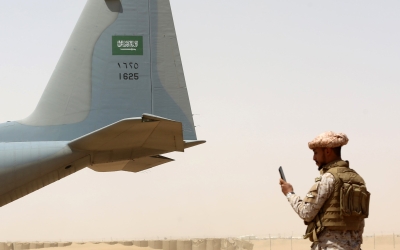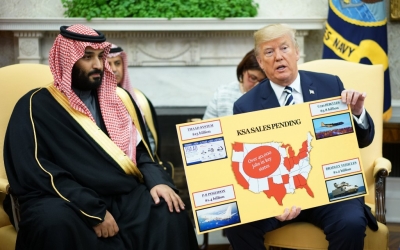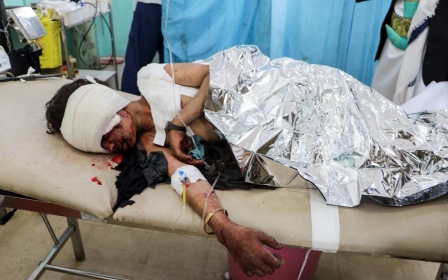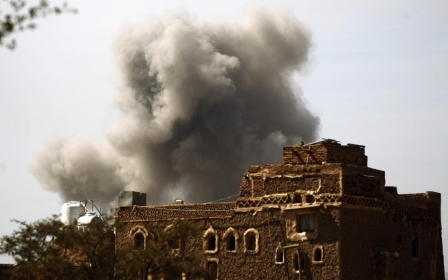US senators vote to block arms sales to Saudi Arabia

The US Senate voted to block arms sales to Saudi Arabia and the United Arab Emirates, dealing a blow to President Donald Trump, who had approved the deals in an emergency declaration without congressional oversight.
In three separate votes, senators approved 22 resolutions on Thursday in an attempt to stop the transfer of more than $8bn in weapons to the two Gulf countries amid the ongoing war and humanitarian crisis in Yemen.
The vote was 53-45 on two resolutions to block the sales of precision-guided munitions, some of which would be produced in Saudi Arabia. Twenty other resolutions passed in a single 51-45 vote.
Trump drew bipartisan criticism from lawmakers late last month when Secretary of State Mike Pompeo declared the administration's plans to bypass Congress and force the arms sales to Riyadh and Abu Dhabi, citing tensions with Iran.
New MEE newsletter: Jerusalem Dispatch
Sign up to get the latest insights and analysis on Israel-Palestine, alongside Turkey Unpacked and other MEE newsletters
Lawmakers quickly introduced the bills to disapprove the sales. After clearing the Senate, the resolutions still need to be approved by the Democratic-controlled House of Representatives before reaching the president's desk.
Trump is likely to veto the measures, but Congress can override his objection with a two-thirds majority in the House and the Senate.
Senator Lindsey Graham, a close ally of Trump, said Saudi leaders are disrespecting the US president with their erratic behaviour.
"I'm trying to deliver the strongest message I know how to deliver: don't take this relationship for granted, and obviously you have," Graham said.
The vote comes a day after a UN rapporteur urged Washington to determine the responsibility of Saudi Crown Prince Mohammed bin Salman in the murder of journalist Jamal Khashoggi, increasing pressure on Trump to hold Riyadh accountable for the killing.
'I'm trying to deliver the strongest message I know how to deliver: don't take this relationship for granted, and obviously you have'
- Lindsey Graham
The report also confirmed gruesome details about the dismembering of Khashoggi's body in the Saudi consulate in Istanbul on 2 October. Saudi government agents had referred to the slain journalist as "the sacrificial animal" before he arrived at the building, the investigation revealed.
"You cannot kill somebody in the most brutal fashion in the consulate of another country, which violates every norm known to the international community because they wrote a bad article about you," Graham said.
"What happens next cannot be business as usual," he added.
Chuck Schumer, the top Democrat in the Senate, also decried the "gross" and "cruel" assassination of Khashoggi.
"They're an ally," he said of Saudi Arabia. "Everyone knows that. It doesn't mean you let allies do the most horrible things and just treat it as if nothing happened."
Yemen war
For his part, Senator Bob Menendez, a key Democrat who had held the sales that were forced through by the administration, questioned the legitimacy of the emergency declaration, saying that it doesn't meet the "basic requirements" laid out by the law.
Menendez also denounced the US role in the conflict in Yemen, where Saudi Arabia is leading a coalition against the country's Houthi rebels.
The war has killed tens of thousands, caused an outbreak of preventable diseases and brought the already impoverished nation to the verge of starvation.
"It is our bombs that are dropping on those civilians. We cannot morally continue to support such sales," Menendez said.
Earlier this year Congress passed a resolution to end US support for the Saudi-led coalition in Yemen, but it was vetoed by Trump and lawmakers failed to override his objection.
"In general, unconditional and indefinite US support has contributed to fuelling the conflict and extending the world's largest human crisis," Scott Paul, a senior humanitarian policy advisor at Oxfam America, told MEE on Thursday.
"Congress needs to demonstrate that it's focused on the survival and welfare of people in Yemen, rather than the relationship with Gulf allies and profits for the arms industry."
Still, Republican Senator Tom Cotton blamed Iran and the Houthis for Yemen's misery, dismissing his fellow lawmakers' concerns about overreach by the Trump administration.
"They're saying in effect, let's block arms sales to our allies in an emergency because the secretary of state hurt the feelings of a few senators," Cotton said on the Senate floor on Thursday.
House Democrats call for investigation
Hours after the passage of the resolutions in the Senate, Democrats on the House Foreign Affairs Committee called for an investigation into Pompeo's emergency declaration.
In a letter to Inspector General Steven Linick, a top oversight official in the Justice Department, more than two dozen members on the committee led by chairman Eliot Engel urged a probe into what they called the "phony emergency".
"The investigation should address the origins of the idea to invoke an emergency, the extent to which dissenting views were expressed and addressed, and the degree to which intelligence and other analysis was considered and incorporated," the letter said.
It added that it is "critical" to look into possible "conflicts of interest among officials" engaged in the decision, including ties to defence industrial firms.
Middle East Eye delivers independent and unrivalled coverage and analysis of the Middle East, North Africa and beyond. To learn more about republishing this content and the associated fees, please fill out this form. More about MEE can be found here.






